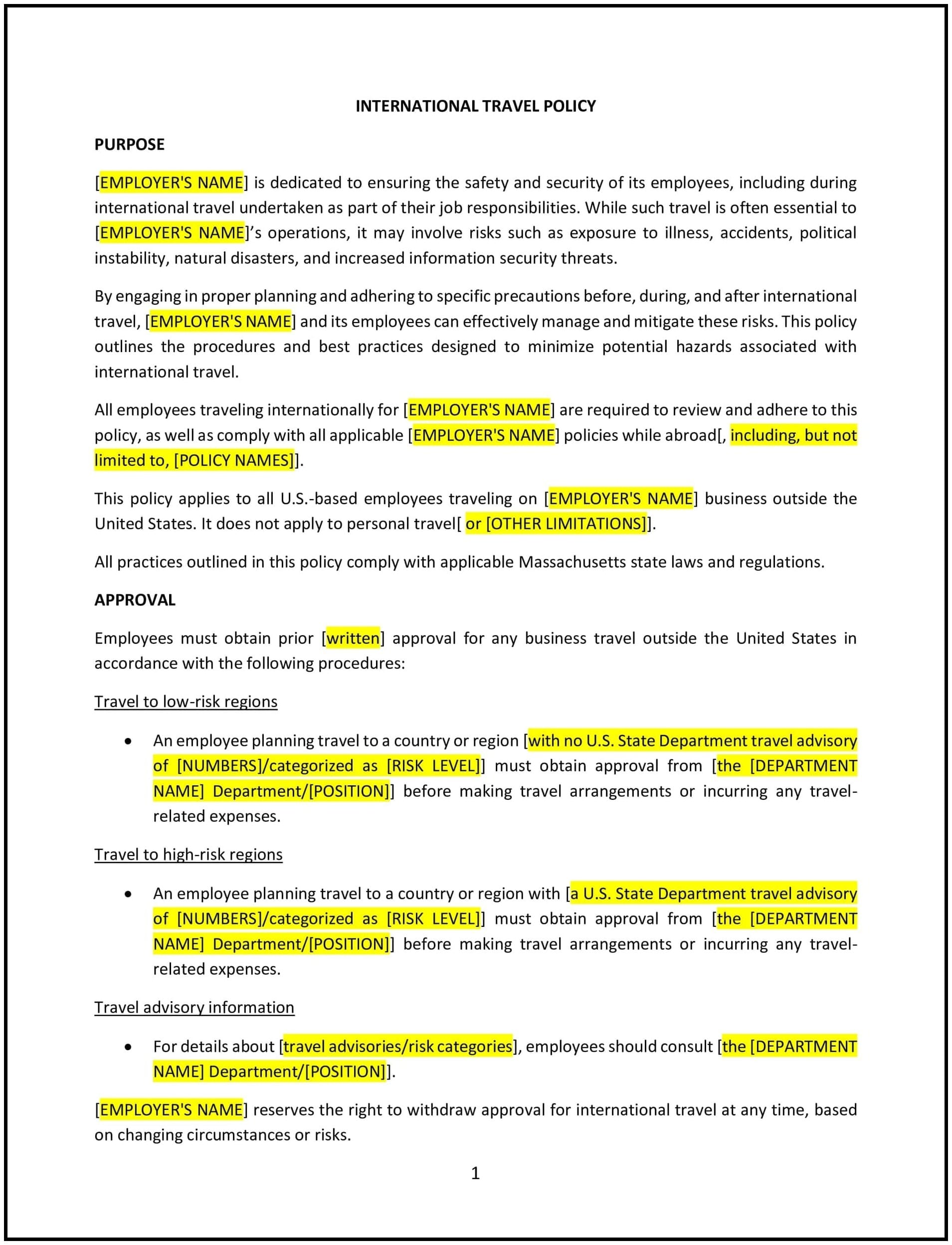International travel policy (Massachusetts): Free template
Got contracts to review? While you're here for policies, let Cobrief make contract review effortless—start your free review now.

Customize this template for free
This international travel policy is designed to help Massachusetts businesses establish guidelines for employees who are traveling internationally for work purposes. The policy outlines the company’s approach to managing international business trips, including travel approval, expenses, safety, and compliance with international regulations. It provides clarity on the responsibilities of both the employer and the employee before, during, and after international travel, ensuring that business travel is conducted efficiently, safely, and in compliance with all relevant laws.
By adopting this policy, businesses can reduce risks associated with international travel, ensure consistency in travel procedures, and promote employee safety and well-being while abroad.
How to use this international travel policy (Massachusetts)
- Define the scope of international travel: Specify what qualifies as international travel under the policy, including any travel for business purposes such as meetings, conferences, training, or site visits. The policy should clarify whether personal travel in addition to business travel is covered under the company’s travel benefits.
- Outline approval procedures: Establish clear procedures for obtaining approval for international travel. Employees should be required to submit travel requests well in advance, detailing the purpose of the trip, travel dates, and expected expenses. The policy should specify who has the authority to approve travel requests.
- Set guidelines for travel expenses: Define what expenses will be reimbursed for international travel, such as airfare, lodging, meals, and transportation. The policy should include daily per diem rates, guidelines for booking flights and accommodations, and procedures for submitting expense reports.
- Address health and safety concerns: Provide guidelines for ensuring employee safety while traveling internationally. This includes recommendations for travel vaccinations, emergency contact information, travel insurance, and how to handle emergencies abroad. The policy should also address any COVID-19-related health and safety measures if applicable.
- Comply with international regulations: Ensure that all travel complies with international laws and regulations, including visa and immigration requirements, foreign tax laws, and trade restrictions. Employees should be informed about the need to adhere to local laws and company policy while traveling.
- Ensure data protection and security: Outline the steps employees must take to ensure the security of company data and personal information while traveling. This may include securing laptops, mobile devices, and confidential information and using secure networks or virtual private networks (VPNs) during travel.
- Address travel documentation and reporting: Specify what documentation employees must carry while traveling internationally, including passports, visas, and travel itineraries. The policy should also require employees to report back to HR or management once the trip has been completed, including submitting an expense report and any key takeaways from the trip.
- Review and update regularly: Periodically review and update the policy to reflect changes in international travel regulations, company needs, or the travel experience.
Benefits of using this international travel policy (Massachusetts)
This policy offers several benefits for Massachusetts businesses:
- Promotes employee safety: By providing clear guidelines and recommendations for travel safety, businesses can ensure the well-being of employees while traveling abroad.
- Reduces risk: The policy helps businesses mitigate risks associated with international travel, including compliance with international regulations, financial management, and data security.
- Ensures consistency: The policy provides a consistent framework for approving and managing international travel, making it easier for employees to understand the process and expectations.
- Improves cost management: By setting clear guidelines for travel expenses and per diem rates, businesses can control costs and reduce the risk of overspending during international trips.
- Enhances business efficiency: Well-defined travel procedures help streamline international travel arrangements, making the process more efficient for both employees and the company.
- Strengthens the company’s reputation: By ensuring that employees are well-prepared and supported during international business trips, companies demonstrate their commitment to employee well-being and professionalism, enhancing their reputation with clients, partners, and other stakeholders.
Tips for using this international travel policy (Massachusetts)
- Communicate the policy clearly: Ensure that all employees who travel internationally are aware of the policy and understand the approval process, travel expenses, safety guidelines, and reporting procedures. Provide training if necessary.
- Provide up-to-date travel information: Ensure that employees are provided with the most current travel information, including safety advisories, health recommendations, and any travel restrictions that may impact their trip.
- Use technology to manage travel: Implement travel management software or tools to streamline the booking process, track expenses, and ensure compliance with the policy.
- Monitor travel expenses: Regularly track travel expenses to ensure they stay within the approved budget and that employees follow the reimbursement process outlined in the policy.
- Address emergencies effectively: Create a clear protocol for handling emergencies, including providing employees with 24/7 access to emergency contacts and resources, such as travel assistance services or embassy contacts.
- Review and update regularly: Periodically review the policy to ensure it remains aligned with company practices, employee feedback, and changes in international regulations.